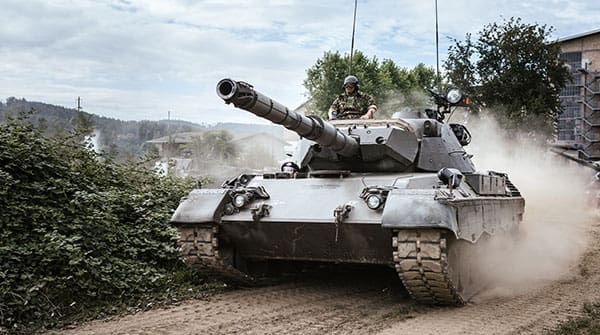A striking parallel can be drawn between the Prigozhin rebellion and Caesar’s historic crossing of the Rubicon
 On June 24, 2023, Yevgeny Prigozhin, founder of the Wagner private military company (PMC), came close to marching several thousand of his brutish, battle-hardened mercenaries into Moscow, a city defended by Rosgvardia militiamen and police officers.
On June 24, 2023, Yevgeny Prigozhin, founder of the Wagner private military company (PMC), came close to marching several thousand of his brutish, battle-hardened mercenaries into Moscow, a city defended by Rosgvardia militiamen and police officers.
It is entirely possible that had Prigozhin not recalled them, the mercenaries would have reached the Kremlin, although they would doubtless have been neutralized eventually by the regular army. Unless, of course, the regular army had defected to the charismatic Prigozhin.
In which case, civil war would have ensued. A debilitating civil war in the mould of the early 20th-century clash between White Russians and Red Russians would suit Ukraine’s and the allies’ purposes.
 Photo by Kevin Schmid |
| Related Stories |
| Julius Caesar’s assassins paid the price
|
| Caesar and Alexander – heroes, villains, or both?
|
| Ukraine needs Apache gunships, not a premature call for reconstruction
|
As Charlotte Higgins, chief culture writer of the British broadsheet The Guardian, pointed out, history is peppered with examples of PMCs led by charismatic demagogues intent on changing the status quo in their favour. Consider, for example, the powerplays of Roman generals Sulla and Caesar. Reflecting on the Wagner PMC’s 2023 march on Moscow, Higgins notes “ … (the) seemingly obvious Roman parallel: Julius Caesar’s crossing (in 49 BC) of the Rubicon and marching of his troops into Italy. Here were Prigozhin and Caesar, two leaders – crucially of private armies fiercely loyal to them personally rather than to the state – taking the remarkable step of ordering their soldiers towards their own empire’s capital. And, just as ‘crossing the Rubicon’ has become a metaphor for taking an irrevocable action, Prigozhin’s act, however abortive the mutiny appears to have been in itself, will have irreversibly altered his own fate”.
There is nothing new under the sun.
The Prigozhin-Putin clash is a fast-moving situation with, due to the fog of war, accurate reporting in short supply. At the time of writing, the basic facts appear to be that:
- Prigozhin is receptive to the idea of his men being barracked in Belarus
- Putin is keen that, in time, the Wagner PMC be subsumed within the army
- Ukraine, suspicious of Wagner’s intentions under the joint control of Prigozhin and Belarussian President Alexander Lukashenko and mindful that Putin’s 2022 assault on Kyiv was launched from Belarus, is strengthening its defences on the Ukraine-Belarus border
- the Russian people and Russia’s state-controlled media are thoroughly confused about the situation, with the latter struggling to find a coherent editorial line on the reframing by a panicked Putin of the previously lionized Prigozhin as an enemy of the state. A dictator who loses control of the narrative is a dead man walking.
Remember what happened in December 1989 to Romanian autocrat Nicolai Ceaucescu? Like Putin, Ceaucescu lost control of the narrative. He and his manipulative wife were detained, bundled into an armoured personnel carrier, tried by a military court, stood in front of a firing squad and dispatched. Romania’s democracy activists, determined to leave no room for doubt in people’s minds as to the Ceaucescus’ crimes and fate, filmed the event. Liberation documented. The narrative secured.
It is entirely possible that, in time, Russian revisionists sympathetic to Putin will reframe the Wagner PMC’s march on Moscow as a Western-inspired plot to topple Putin and install a regime sympathetic to the allies’ cause. In formulating such an account, revisionists would have to conceal the fact that Prigozhin mutinied not because he sympathized with Ukraine’s cause or because he subscribes to the liberal values articulated by, for example, the Canadian government, but because he wanted Russia’s Ministry of Defence to prosecute the war with more vigour. For Prigozhin and his recidivist acolytes, no act is too barbarous if it helps protect and expand the Russki mir.
In September 2022, former Russian convict Alexey Savichev joined the Wagner PMC. As reported in The Guardian’s April 18, 2023 edition, Savichev killed Ukrainian prisoners of war. Said Savichev: “We were told not to take any prisoners (of war), and just shoot them on the spot”. Another Wagner mercenary, Azamat Uldarov, admitted to killing a child hiding in a Bakhmut cellar: “She was screaming, she was a little kid, she was five or six and I shot her, a kill shot. I wasn’t allowed to let anyone out, you understand?”
In May 2023, the United Nations published its report on the killing of civilians in the Malian village of Moura in March 2022 by Malian soldiers and Wagner PMC mercenaries. The May 20, 2023 edition of The Guardian noted: “Investigators from the UN human rights office concluded that there are strong indications that more than 500 people were killed – the majority in extrajudicial killings – by Malian troops and foreign military personnel believed to be from Wagner …. Wagner has been accused of involvement in multiple massacres in Mali as well as elsewhere in the Sahel and central Africa. Witnesses say the group has been caught up in fierce fighting in [the] Central African Republic in recent months …. As France and the US have shifted resources … away from Africa … Russia has moved to fill the gap, mounting a series of diplomatic offensives and using Wagner to win over regimes in key states by offering to bolster weak security forces”.
In summary:
- Prigozhin and his convict friends are more barbarous than Putin and his Kremlin sycophants, if that is possible. Prigozhin isn’t a solution to Putin. He’s part of the same problem
- history holds lessons we forget at our peril. Remember the destruction delivered by the PMCs of Sulla and Caesar. She who forgets or ignores the past risks having it repeat.
Dr. Simon Bennett directs the Civil Safety and Security Unit at the University of Leicester. He’s interested in the organizational, social, economic and political origins of risk. He has worked with the Royal Air Force and U.K. National Police Air Service on human factors issues. His latest book, Safety in Aviation and Astronautics: A Socio-technical Approach, was published by Routledge in 2022.
For interview requests, click here.
The opinions expressed by our columnists and contributors are theirs alone and do not inherently or expressly reflect the views of our publication.
© Troy Media
Troy Media is an editorial content provider to media outlets and its own hosted community news outlets across Canada.

